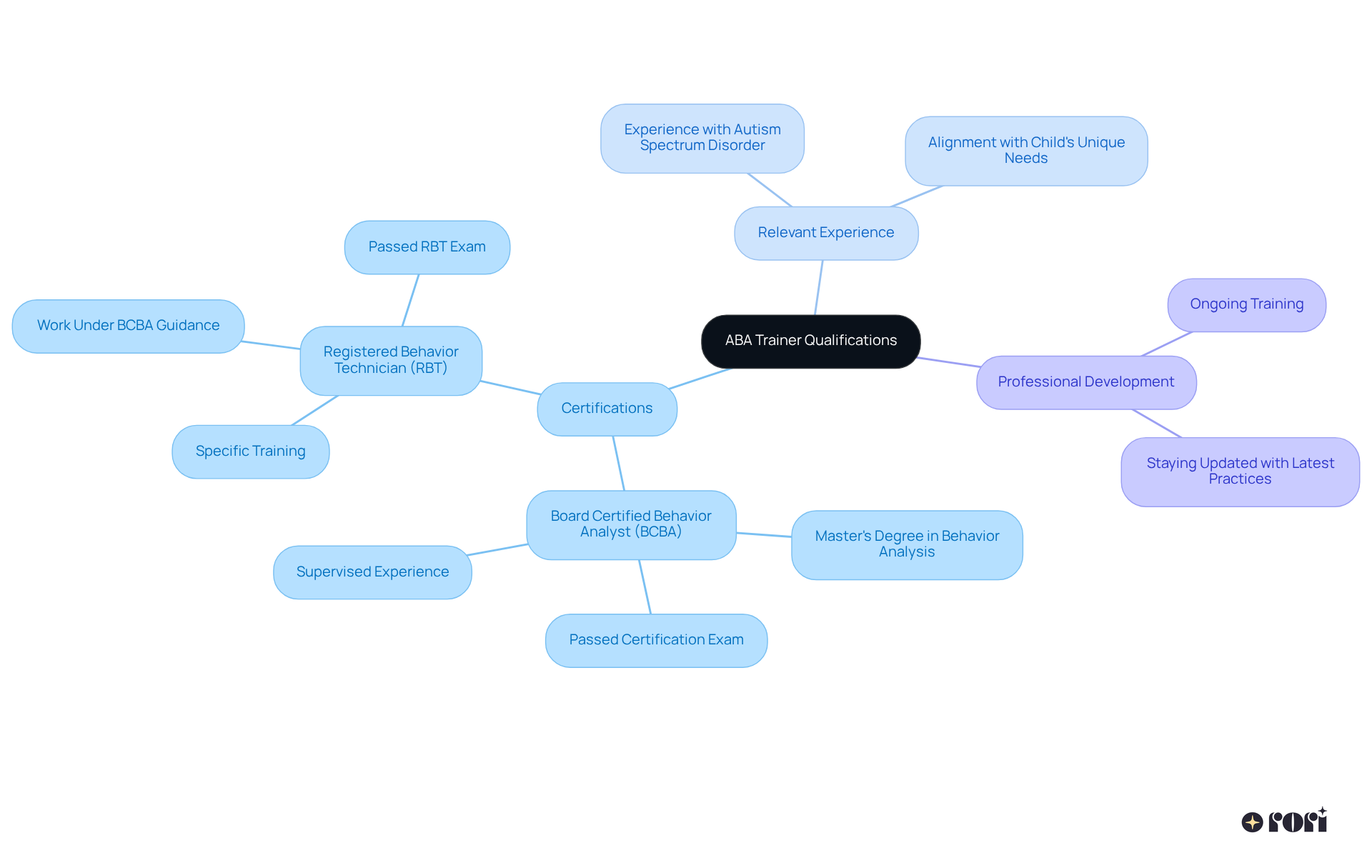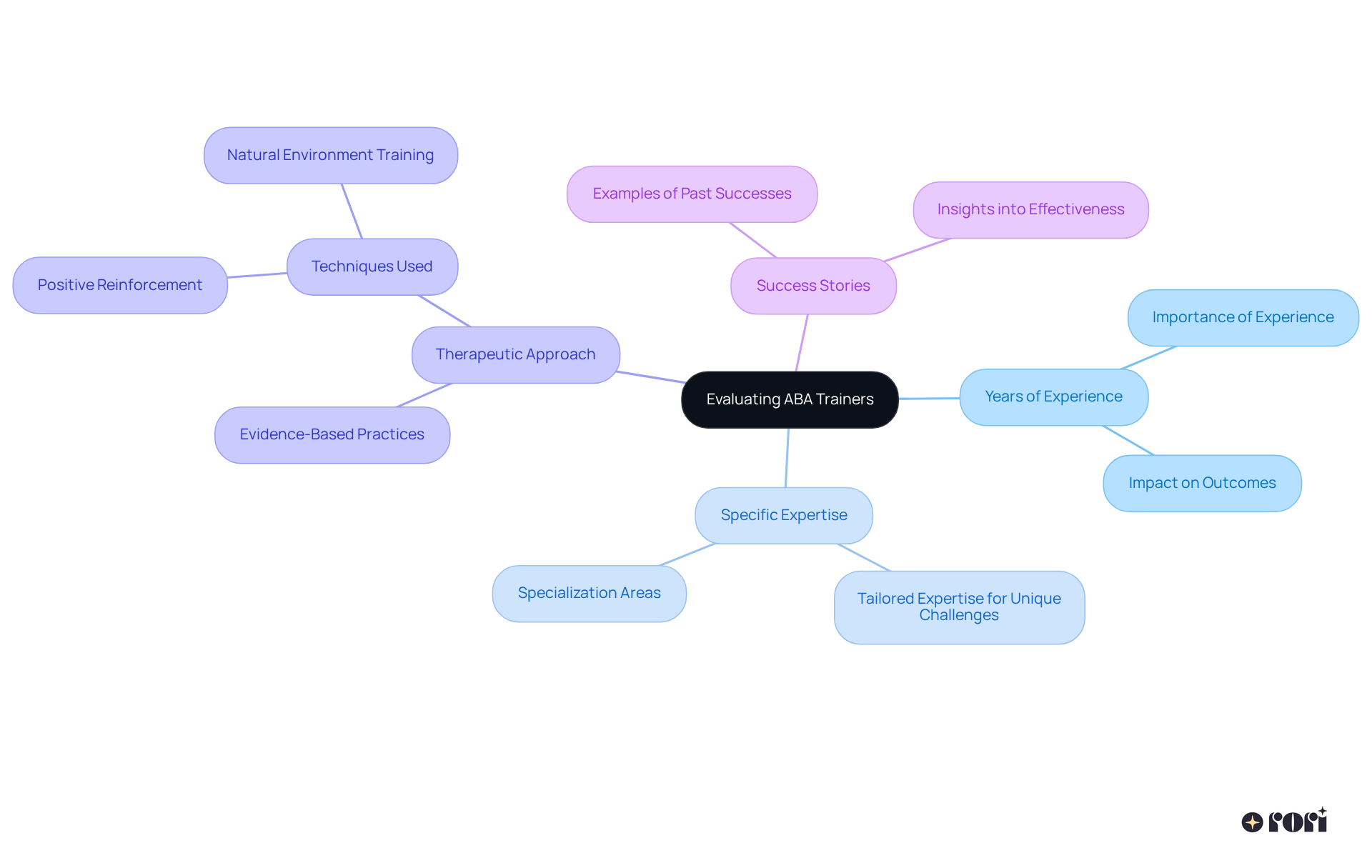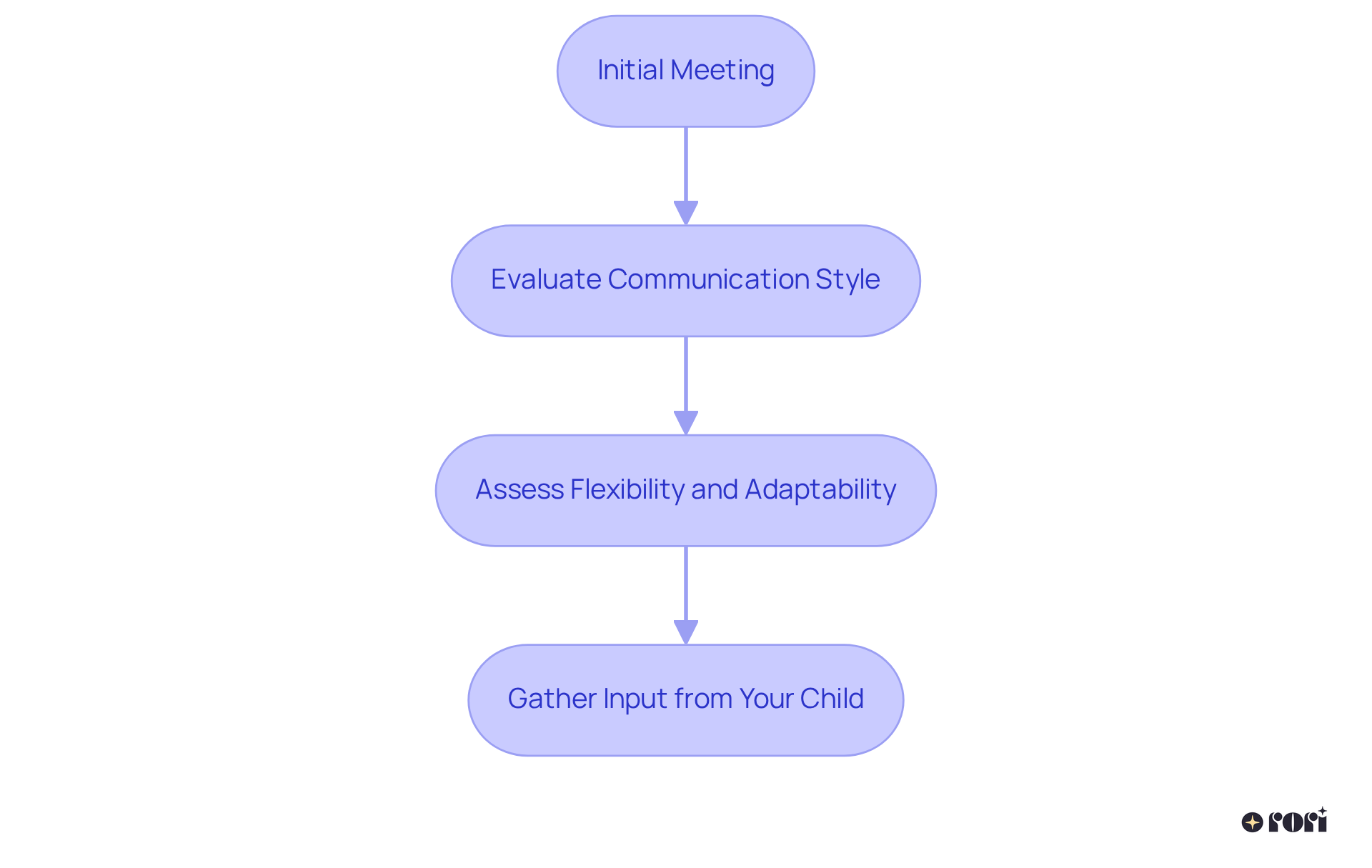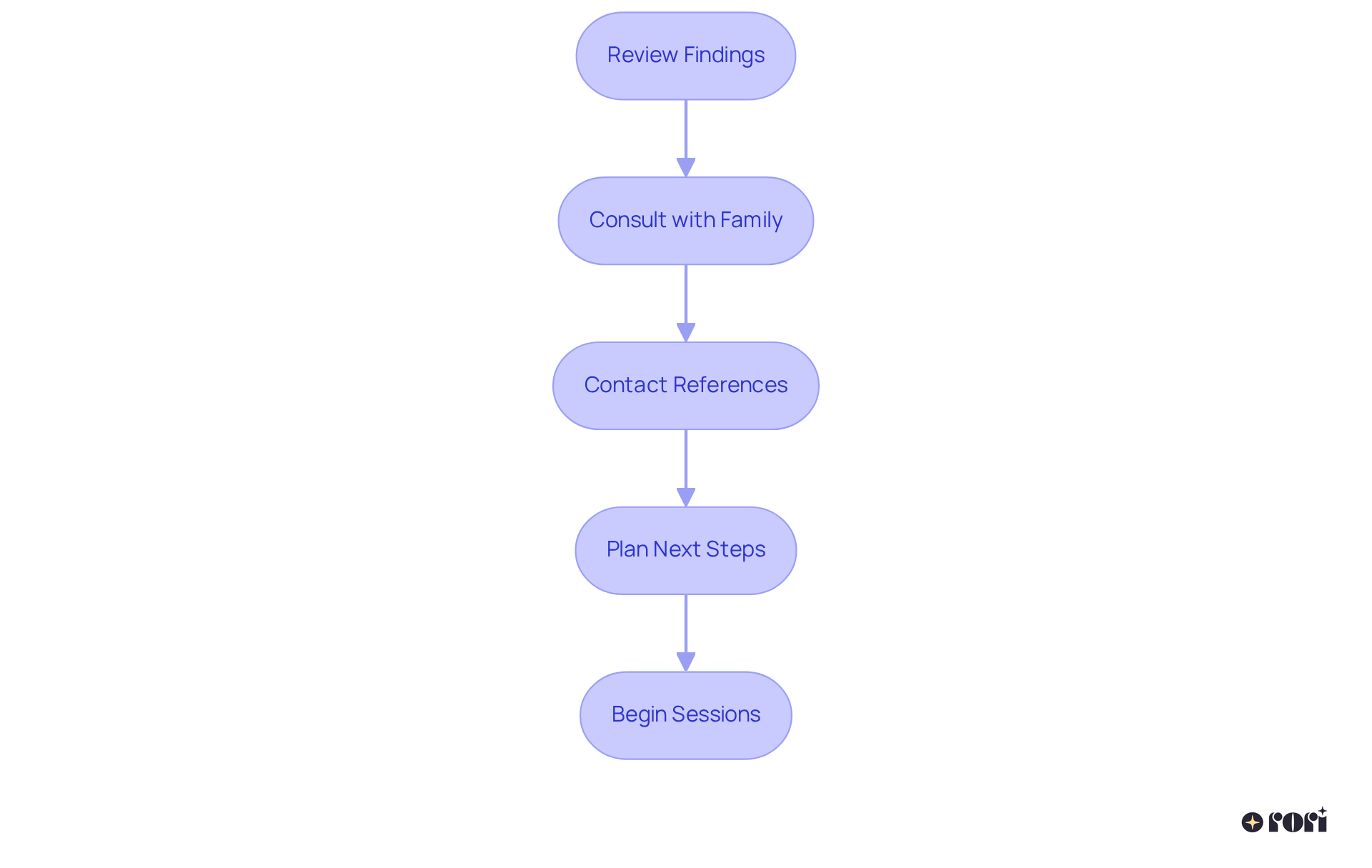Choosing the right ABA trainer for your child can feel overwhelming, right? It’s all about finding someone who truly understands your child’s unique needs. Start by checking their qualifications and experience. Look for certifications like BCBA and RBT—these are important credentials!
Next, think about the therapeutic approaches they use. Have they shared success stories? This can give you insight into their effectiveness. And don’t forget, building a positive rapport between the trainer and your child is crucial. A warm connection can lead to effective therapy and meaningful progress.
Let’s explore this together! Finding the right fit can make all the difference for your child’s journey. We’re here to help you every step of the way!
Choosing the right ABA trainer for your child can feel like navigating a complex maze, especially when it comes to their development and well-being. As parents, you want professionals who not only have the right qualifications but also truly understand your child’s unique needs. This article will guide you through selecting an ABA trainer, highlighting the essential qualifications, evaluating experience, and assessing compatibility.
But what happens when those perfect credentials don’t quite match your child’s specific requirements? Exploring this challenge can lead to transformative insights, ensuring the best support for your child's growth.
Let’s explore this together!
When you're on the lookout for an ABA trainer for your child, it’s important to recognize some key qualifications. Start by considering trainers who have earned certifications like these:
Don’t forget to ask about ongoing professional development and training. This is crucial to ensure that the instructor stays updated with the latest practices in ABA therapy. Empowering caregivers with ABA principles and strategies is essential for supporting children’s behavioral goals, and a qualified instructor will help make this happen through active involvement and data collection.
Let’s explore this together! Finding the right support can make all the difference for your child’s growth.

When it comes to choosing potential ABA trainers, it's so important to take a close look at their experience and therapeutic methods. This is especially true when you consider the importance of RBT certification and their familiarity with the RBT Task List. This certification ensures that instructors have the necessary qualifications to provide effective ABA treatment. Here are a few things to think about:
By focusing on these important aspects, you can make a more informed choice in selecting an ABA trainer who truly fits your child's needs and supports their growth. At Rori Care, we’re dedicated to empowering caregivers with the knowledge and strategies they need to support their children’s behavioral goals. We want to ensure that the instructors you consider are not only qualified but also share our mission of fostering development. Let’s explore this together!

Building a harmonious relationship between the ABA specialist and your child is essential for effective therapy. Let’s dive into some steps to help you assess this connection:
By focusing on these aspects, you can ensure that the ABA trainer you choose aligns well with your child’s unique needs. Together, we can set the stage for effective and meaningful therapy. Let’s explore this journey together!

After assessing potential ABA instructors, making an informed decision is essential. Let’s walk through some steps together:
Review Findings: Take a moment to examine the qualifications, experience, and compatibility assessments you’ve gathered. Creating a list of pros and cons for each instructor can help clarify your options. Understanding ABA principles and strategies will assist you in figuring out which ABA trainer best suits your needs.
Consult with Family: It’s important to engage family members or caregivers involved in your child’s care in discussions about your findings. Their insights can be incredibly valuable! Studies show that increased parent involvement leads to better outcomes in ABA therapy. By educating yourself and your family about ABA, you can make more informed decisions that positively impact your child’s progress. Plus, this knowledge helps reduce stress and improves family dynamics.
Contact References: Don’t hesitate to reach out to references or other parents who have previously worked with the instructor. This step can provide additional insights into the instructor’s effectiveness and methods. In fact, around 70% of parents refer to references before making a decision! Understanding how other caregivers have benefited from the instructor’s techniques can really empower you in your decision-making process.
Plan Next Steps: Once you’ve made your decision, it’s time to contact the aba trainer you have chosen to discuss starting the sessions. Establish clear objectives and expectations for the therapy process. Staying actively engaged in your child’s progress through regular updates and communication is crucial. This collaborative approach nurtures a supportive atmosphere for your child’s development. Remember, your active involvement and understanding of ABA strategies will enhance the support you provide at home, complementing professional interventions.
Ready to take the first step toward a brighter future for your child? Let’s explore this together! Sign up for a free consultation.

Choosing the right ABA trainer for your child is a big decision that can really shape their developmental journey. By understanding what qualifications are necessary, evaluating experience and therapeutic approaches, and assessing compatibility, you can find a trainer who truly aligns with your child's unique needs.
It's important to look for certifications like BCBA and RBT, and consider the value of relevant experience with children on the autism spectrum. Plus, building a positive rapport between the trainer and your child is essential for effective therapy. Engaging in open communication with family members and seeking references can really strengthen your decision-making process, ensuring that the trainer you choose is equipped to foster meaningful progress.
Ultimately, finding the right ABA trainer goes beyond just qualifications; it's about creating a supportive environment that encourages growth and development. Taking the time to research and reflect on these elements empowers you to make informed choices, paving the way for a brighter future for your child. Let’s embrace this opportunity to explore the best options available and take proactive steps toward enhancing your child’s learning and behavioral goals. We're here to help you every step of the way!
What certifications should I look for in an ABA trainer?
Look for certifications such as Board Certified Behavior Analyst (BCBA) and Registered Behavior Technician (RBT). BCBA certification indicates that the trainer has completed a master's degree in behavior analysis or a related field, gained supervised experience, and passed a challenging exam. RBT certification requires specific training and passing an exam, and RBTs work under the guidance of BCBAs.
What is the role of a Registered Behavior Technician (RBT)?
An RBT is an entry-level certification holder who works under the supervision of a BCBA. They must complete specific training and pass a board exam that assesses their knowledge of the RBT Task List, ensuring they are well-prepared to support children effectively.
Why is relevant experience important for an ABA trainer?
Relevant experience is crucial because it ensures that the educator has worked with children on the autism spectrum and can address your child's unique needs effectively.
How can I ensure that an ABA trainer stays updated with best practices?
Inquire about the trainer's ongoing professional development and training. This is important to ensure they are familiar with the latest practices in ABA therapy.
How does an ABA trainer support caregivers?
A qualified ABA trainer empowers caregivers by teaching them ABA principles and strategies, which are essential for supporting children's behavioral goals. This involves active involvement and data collection to track progress.